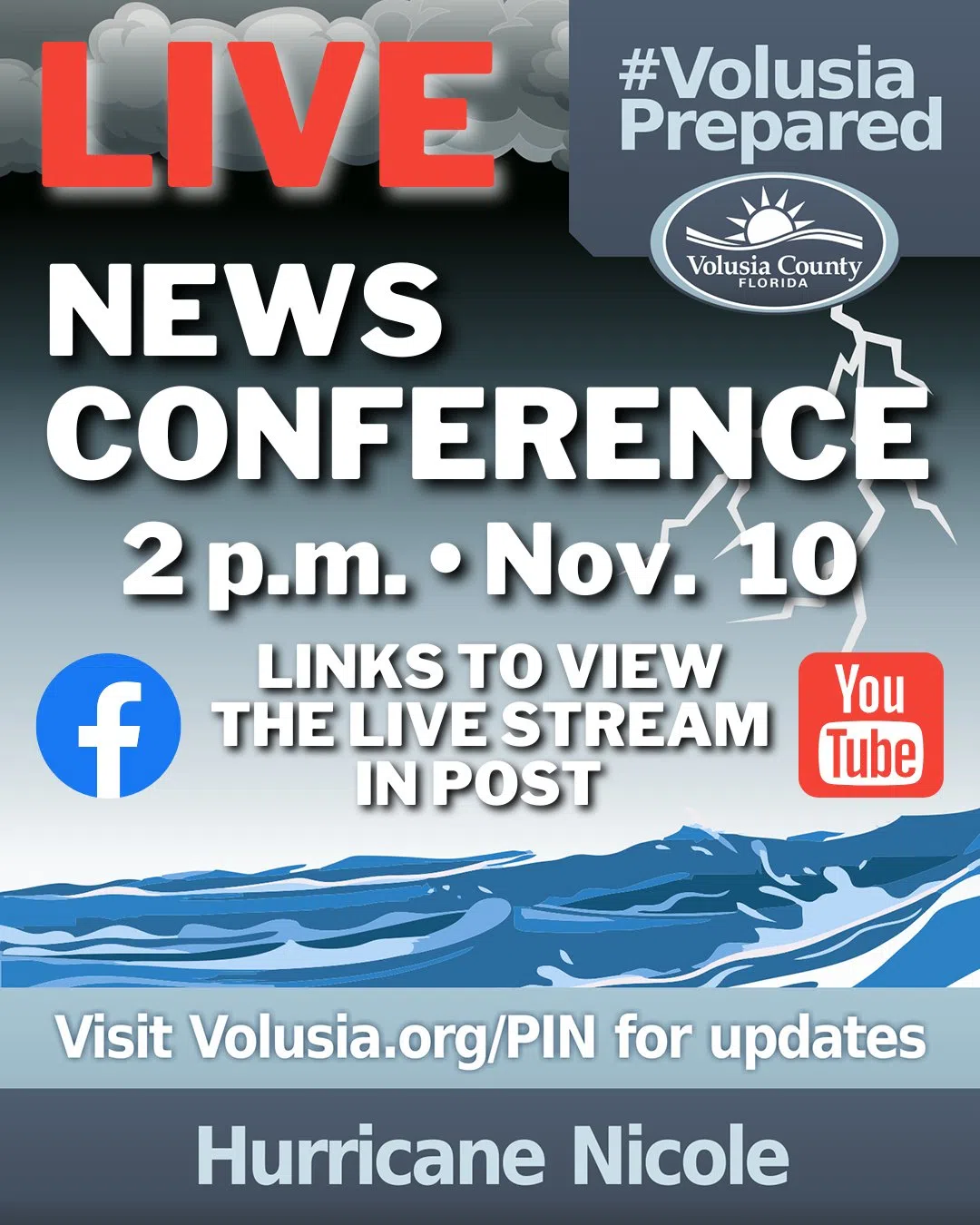Hurricane Nicole update 9: Post-storm information
Volusia County’s emergency management officials continue to monitor impacts from Hurricane Nicole. Here’s the latest information from the Emergency Operations Center.
Bridges
Volusia County Sheriff Mike Chitwood has ordered the closure of all bridges to the beachside with the exception of the North and South Causeways in New Smyrna Beach. Only essential personnel are allowed to cross the closed bridges until further notice.
Curfew
Volusia County has declared a curfew in incorporated and unincorporated areas east of the Intracoastal Waterway from 11:22 a.m. Thursday, Nov. 10, through 7 a.m. Friday, Nov. 11. The curfew does not apply to regular members of law enforcement and regular employees of local businesses, industries and governmental entities while traveling to and from their jobs. All emergency workers are exempt, provided they have identification if stopped by law enforcement personnel.
Avoid unnecessary driving
Residents are advised to shelter in place and stay off the roads until notified that it’s safe to go out. Standing water, downed trees and other debris could make roads dangerous and impassible.
Traffic signals
Some traffic signals may not be operating. If you approach an intersection that is not operable, you must treat it as a four-way stop.
Downed power lines and outages
As of 11 a.m., nearly 35,000 Volusia County homes and businesses were without power.
If you see a downed line, assume that it’s electrified and don’t touch it or go near it. Report it to your power company as well as the Citizens Information Center at 866-345-0345.
To report power outages or downed power lines, contact your electric provider:
FPL: fpl.com, 800-468-8243
Duke Energy: duke-energy.com, 800-228-8485
New Smyrna Beach Utilities: nsbufl.com, 386-427-1366
Clay Electric: clayelectric.com, 888-434-9844
Shelters
Two hundred residents sought shelter in Volusia County’s shelters.
Three shelters remain open:
Creekside Middle School, 6801 Airport Road, Port Orange (general population)
Heritage Middle School, 1001 Parnell Court, Deltona (general population and special needs)
David C. Hinson Middle School, 1860 N. Clyde Morris Blvd., Daytona Beach (special needs)
All three shelters will accept pets. Those staying at a shelter with their pets must bring necessary pet items and supplies.
Generator safety
Carbon monoxide (CO) is an invisible, odorless, tasteless gas and is highly poisonous. Depending on the level of exposure, CO may cause fatigue, weakness, chest pains for those with heart disease, shortness of breath upon exertion, nausea, vomiting, headaches, confusion, lack of coordination, impaired vision, loss of consciousness, and in severe cases, death.
If you lose power and plan to use a generator, follow these safety tips:
Placement is key. Never use generators indoors or outside near windows, vents or air intakes that could allow carbon monoxide to come indoors. This can be fatal.
Use proper care. Proper ventilation is critical to reducing the risk of carbon monoxide poisoning from a generator’s engine exhaust. CO poisoning is a common, serious danger that can cause death if generators are used improperly; this is particularly true when the fuel is not burned completely.
Keep other items clear. Maintain plenty of air flow space around the generator.
Pay attention. Get fresh air immediately if you begin to feel sick, dizzy or light-headed or experience flu-like symptoms.
Buy a CO detector. Because CO is invisible and odorless, buy a CO detector (similar to or sometimes combined in a smoke detector) to warn of rising CO levels.
Ground your generator. Carefully follow all instructions on properly “grounding” the generator.
Keep the generator dry. Short circuits may occur in wet conditions, which can cause a generator fire. If needed, place the generator under an open canopy-type structure.
Be prepared. Always keep a fully charged fire extinguisher nearby.
Leave it to the professionals. To avoid electric shock or electrocution, do not try to fix or otherwise work on a generator.
Organize your cords. Keep cords out of the way to avoid injury but keep them in plain view to keep track of cord damage (such as fraying or cuts) that could cause a fire.
Never back-feed power. Do not plug the generator into a wall outlet. Back feeding will put you and others, including utility line workers, at serious risk because the utility transformer can increase low voltage from the generator to thousands of volts.
Don’t touch. It’s hot. The exterior portions of a generator, even if operated for only a short period of time, can become hot. Avoid touching the generator without protective gear and keep debris clear to avoid a fire.
Shut off your generator and allow it to cool for 10 minutes before refueling. Extremely hot exhaust can lead to the unsafe ignition of spilled gas or concentrated vapors.
Hotel accommodations
Evacuees seeking accommodations on the mainland side of Volusia County can visit the following link: https://www.daytonabeach.com/…/near-daytona…/. In addition, Visit Florida has activated the Emergency Accommodations Module on Expedia.com to provide real-time hotel and lodging availability for impacted Floridians and visitors.
Citizens Information Center
For additional information related to the storm, visit volusia.org/PIN or call the Citizens Information Center at 866-345-0345.






Comments